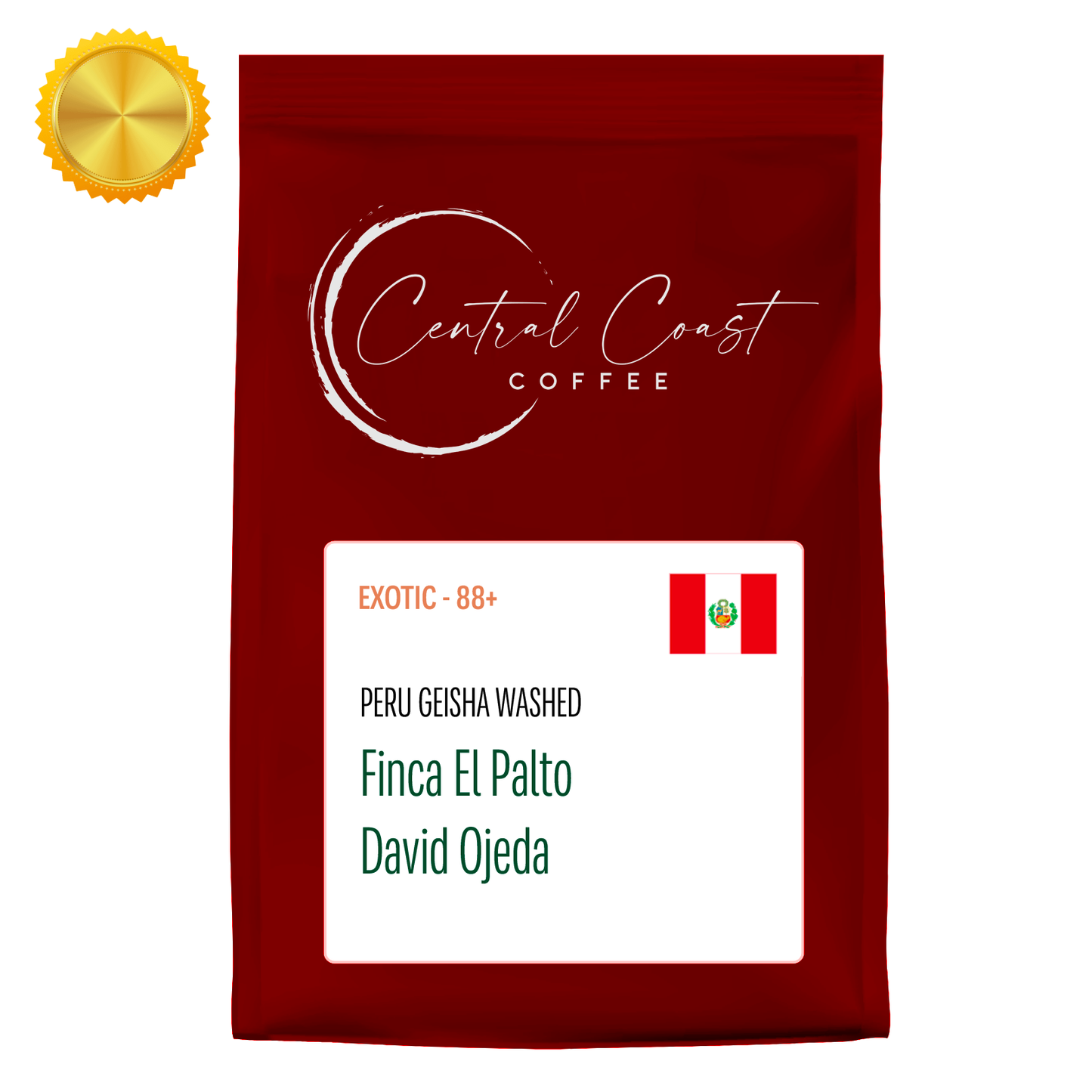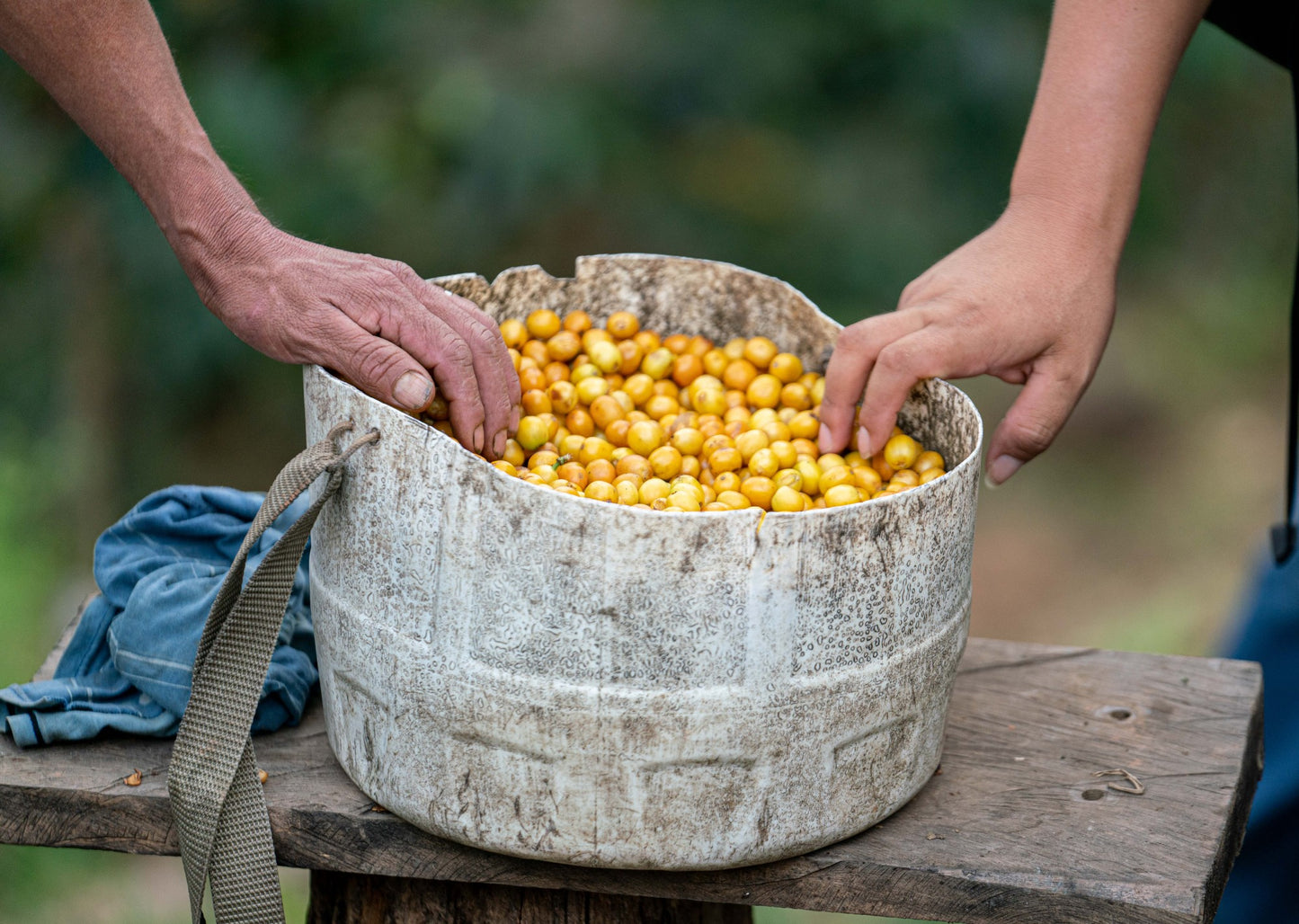



This coffee’s roasted in our filter style — meaning it’s designed to shine as black coffee rather than with milk. That doesn’t mean you have to brew it as a pour-over though. You can make it however you like — espresso, moka pot, AeroPress or anything in between. We simply roast it a little lighter to highlight the bean’s origin flavours giving you a cup that’s clean, vibrant and full of clarity.
Lighter roasting keeps more of the natural acidity and sweetness intact which makes for a beautifully expressive black coffee — and this one happens to play nicely with milk too. Expect a softer balanced cup where the sweetness carries through without turning sharp.
If you prefer your milk coffee with richer caramel, toffee or nutty flavours you might enjoy our espresso range more. Those roasts are taken a little darker to bring out deeper sweetness and balance beautifully with milk.
Origin and Sourcing
?
?
?
Roast Details
?
?
?
?
?
?
?
?
Taste Profile
?
?
Peru | Finca El Palto | David Ojeda | Geisha Washed | Signature Series - When is peak freshness?
Nordic Ultra-light Roast - Roasted on Roest L100 Ultra
About David Ojeda
Finca El Palto, owned by David Ojeda, is nestled in the picturesque region of Ihuamaca, within San Ignacio in the Cajamarca region of Peru. The farm began as a one-hectare plot, a labor of love made possible by selling land in the jungle and relocating to David's home province. Today, Finca El Palto represents not just a source of income but a way of life centered on family, hard work, and a commitment to quality. The farm now has 3.5 hectares of coffee.
The coffee cultivation process on Finca El Palto is both meticulous and traditional. Harvesting is done manually, ensuring only the ripest cherries are selected. Fermentation is carried out for 30 hours in bags and sacks, while washing is performed in a vat tank. Drying takes place in specialized drying modules or bubble tents over a period of 15 to 20 days, allowing the beans to develop their full flavor potential.
David employs sustainable practices on his farm, relying primarily on machete weeding and enlisting the help of his large family for all stages of the coffee-growing season, including harvesting, fertilizing, and maintenance. The family’s collective effort ensures that the farm operates efficiently and reflects their shared dedication to its success.
Finca El Palto is more than just a coffee farm—it's a vision for the future. David aims to expand his coffee production by planting more varieties to improve both yield and quality. The farm also supports his aspirations for his children’s education and additional sources of income, such as cattle raising and poultry farming, which complement the family’s nutrition and sustainability goals.
For David Ojeda, Finca El Palto is a business, a livelihood, and a legacy, nurtured with care to sustain his family and produce high-quality coffee that embodies the dedication and spirit of the Cajamarca region.
Finca El Palto, owned by David Ojeda, is nestled in the picturesque region of Ihuamaca, within San Ignacio in the Cajamarca region of Peru. The farm began as a one-hectare plot, a labor of love made possible by selling land in the jungle and relocating to David's home province. Today, Finca El Palto represents not just a source of income but a way of life centered on family, hard work, and a commitment to quality. The farm now has 3.5 hectares of coffee.
The coffee cultivation process on Finca El Palto is both meticulous and traditional. Harvesting is done manually, ensuring only the ripest cherries are selected. Fermentation is carried out for 30 hours in bags and sacks, while washing is performed in a vat tank. Drying takes place in specialized drying modules or bubble tents over a period of 15 to 20 days, allowing the beans to develop their full flavor potential.
David employs sustainable practices on his farm, relying primarily on machete weeding and enlisting the help of his large family for all stages of the coffee-growing season, including harvesting, fertilizing, and maintenance. The family’s collective effort ensures that the farm operates efficiently and reflects their shared dedication to its success.
Finca El Palto is more than just a coffee farm—it's a vision for the future. David aims to expand his coffee production by planting more varieties to improve both yield and quality. The farm also supports his aspirations for his children’s education and additional sources of income, such as cattle raising and poultry farming, which complement the family’s nutrition and sustainability goals.
For David Ojeda, Finca El Palto is a business, a livelihood, and a legacy, nurtured with care to sustain his family and produce high-quality coffee that embodies the dedication and spirit of the Cajamarca region.
-
About Geisha Varietal
Geisha (also known as Gesha) is known for its exceptional cup quality, especially when grown at high altitudes. The variety comes from Ethiopian landrace coffees and was collected from Ethiopian coffee forests in the 1930s. The name supposedly derives from Ethiopia’s Gori Gesha forest.
There is some confusion with several genetically distinct varieties that have all been called Geisha, but the most famous variety is the Panama one. The variety was brought to Lyamungu research station in Tanzania and from there to Centro Agronómico Tropical de Investigación y Enseñanza (CATIE) in Central America in 1953. At CATIE, the variety was logged as T2722. CATIE distributed T2722 across Panama in the 1960s for its Coffee Leaf Rust (CLR) resistance, but its brittle branches meant it was not widely planted.
Panama Geisha reached its modern fame in 2005 when a Geisha lot won the “Best of Panama” competition and broke contemporary records at over $20/pound. DNA analysis has demonstrated that the Panama Geisha descended from T2722 is distinct and uniform. Today, Geisha is known for its delicate florals, jasmine and stone fruit.
Coffee in Peru
Though coffee arrived in Peru relatively early—in the middle of the 1700s—it wasn’t cultivated for commercial export until nearly the 20th century as demand from Europe rose due to a significant decrease in coffee production in Indonesia. British presence and influence in the country helped increase and drive exports. In the early 1900s, the British government took ownership of roughly 2 million hectares of land from the Peruvian government as payment on a defaulted loan, and much of that land became British-owned coffee plantations.
As in many Central and South American countries, the large European-owned landholdings were sold or redistributed throughout the 20th century. Farms became smaller and more fragmented, offering independence to farmers but also limiting their access to resources and a larger commercial market. Unlike many other countries whose coffee economy is dominated by smallholders, Peru lacks the organization or infrastructure to provide economic or technical support to farmers—a hole that outside organizations and certifications have sought to fill. The country has a remarkable number of certified-organic coffees, as well as Fair Trade, Rainforest Alliance, and UTZ-certified coffees. Around 30 percent of the country’s smallholders are members of democratic co-ops, which has increased the visibility of coffees from the area but has done little to bring incredibly high-quality lots into the spotlight.
As of the 2010s, Peru is one of the top producers of Arabica coffee, often ranked fifth in world production and export of Arabica. The remoteness of the coffee farms and the incredibly small size of the average farm have prevented much of the single-farm differentiation that has allowed for microlot development and marketing in other growing regions, but as with everything else in specialty coffee, this is changing quickly as well. The country’s lush highlands and good heirloom varieties offer the potential for growers to beat the obstacles of limited infrastructure and market access, and as production increases, we are more likely to see those types of advancements.
SKU: peru_el_palto_160g
Package Weight: 200g




